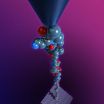(Press-News.org) URBANA – University of Illinois scientists have learned to mask the bitterness of ginseng, a common ingredient of energy drinks.
"Consumers like to see ginseng on a product's ingredient list because studies show that it improves memory, enhances libido and sexual performance, boosts immunity, and alleviates diabetes. But the very compounds that make ginseng good for you also make it taste bitter," said Soo-Yeun Lee, a U of I associate professor of food science and human nutrition.
In an earlier study, Lee and U of I professor of food chemistry Shelly J. Schmidt found that ginseng contributes more to the bitter perception in energy drinks than caffeine, an indispensable component of these beverages and the very compound that sensory scientists use as their reference for bitter perception.
"Ginseng has over 30 bitter compounds, and scientists still don't know which compound or group of compounds is responsible for the bitter taste," Lee said.
While experimenting with five possible solutions to ginseng's bitterness problem, they discovered that cyclodextrins—hydrophobic compounds made of glucose molecules that occur in a ring form—were able to capture the bitter flavor compounds and reduce bitterness by more than half.
Lauren Tamamoto, a graduate student who worked on the study, assembled a group of 13 non-smokers who also lacked allergies that would affect their bitter perception. Panelists had to be able to detect a chemical called 6-n-propyl-2-thiouracil (PROP) on a piece of filter paper (some people can, some people can't) and also pass basic taste tests for sweet, sour, bitter, and salty perceptions. They then participated in 12 training sessions and taste-tested 84 samples, rating each on a 16-point scale.
The researchers used the panelists to test these potentially effective bitterness-reducing treatments:
adding a related complementary flavor (in this case, citrus) as a sensory distraction
incorporating a bitterness blocking agent that neutralizes the taste buds
using ingredient interaction (the scientists added large amounts of taurine because research indicated that it might be useful in blocking bitterness)
utilizing an enzyme that would break down the peptide bonds of bitter components
experimenting with complexation, or the use of cyclodextrins to form inclusion complexes with the bitter compounds, which masks the bitter taste
"Cyclodextrins were by far the most effective method of reducing the bitterness of ginseng solutions. We also found that gamma-cyclodextrins were more successful than beta-cyclodextrins and were more cost-effective," Schmidt said.
These compounds have been used to mask bitterness before, but not at the level of ginseng used in a typical energy drink, she said.
Lee and Schmidt intend to continue studying ginseng's bitterness compounds to learn which are most responsible for producing objectionable flavors, and to gain insight into exactly how these compounds interact with cyclodextrins.
That knowledge would facilitate the use of ginseng as a functional ingredient in energy drinks and allow their manufacturers to add health benefits to the beverages beyond general nutrition and the calories they provide, Lee said.
"The U.S. energy drink industry is expected to reach $19.7 billion in sales by 2013, even though these beverages often have a medicinal taste because of their functional ingredients. If we can create more palatable products, manufacturers will be able to expand this market even further.
"But, beyond that, this new method for masking bitterness in ginseng gives food scientists an opportunity to improve the health of consumers," she said.
INFORMATION:
The study was published in the September 2010 issue of the Journal of Food Science. Lee, Schmidt, and Tamamoto were co-authors of the paper.
Illinois study: Ginseng just got better -- not as bitter
2010-12-07
ELSE PRESS RELEASES FROM THIS DATE:
Optics Express focus issue on chalcogenide photonics: Fabrication, devices and applications
2010-12-07
WASHINGTON, Dec. 6—Recent progress in chalcogenide glass photonics has been driven by scientific and technological challenges in a variety of areas. These range from increased demand for bandwidth in optical communications, to the emergence of bio-health hazards associated with hazardous microorganisms that absorb at mid-infrared wavelengths, to defense applications that require bright mid-infrared sources. Additionally, chalcogenide glass provides a platform for fundamental investigations of light-matter interactions in nanophotonic structures, such as photonic crystals ...
Fleshing out the life histories of dead whales
2010-12-07
Dead whales that sink down to the seafloor provide a feast for deep-sea animals that can last for years. Previous research suggested that such "whale falls" were homes for unique animals that lived nowhere else. However, after sinking five whale carcasses in Monterey Canyon, researchers from the Monterey Bay Aquarium Research Institute (MBARI) found that most of the animals at these sites were not unique to whale falls, but were common in other deep-sea environments as well. Nonetheless, the whale-fall communities did include a few very abundant animals that were "bone ...
A flu vaccine that lasts
2010-12-07
WHAT: The costly, time-consuming process of making, distributing and administering millions of seasonal flu vaccines would become obsolete if researchers could design a vaccine that confers decades-long protection from any flu virus strain. Making such a universal influenza vaccine is feasible but licensing it may require innovation on several fronts, including finding new ways to evaluate the efficacy of vaccine candidates in clinical trials, conclude scientists from the National Institute of Allergy and Infectious Diseases (NIAID), part of the National Institutes of Health. ...
Rice physicists help unravel mystery of repetitive DNA segments
2010-12-07
HOUSTON -- (Dec. 6, 2010) -- With new tools that can grab individual strands of DNA and stretch them like rubber bands, Rice University scientists are working to unravel a mystery of modern genomics. Their latest findings, which appear in Physical Review Letters, offer new clues about the physical makeup of odd segments of DNA that have just one DNA base, adenine, repeated dozens of times in a row.
These mysterious "poly(dA) repeats" are sprinkled throughout the human genome. Scientists have also found them in the genomes of animals, plants and other species over the ...
Why married men tend to behave better
2010-12-07
EAST LANSING, Mich. — Researchers have long argued that marriage generally reduces illegal and aggressive behaviors in men. It remained unclear, however, if that association was a function of matrimony itself or whether less "antisocial" men were simply more likely to get married.
The answer, according to a new study led by a Michigan State University behavior geneticist, appears to be both.
In the December issue of the Archives of General Psychiatry, online today, S. Alexandra Burt and colleagues found that less antisocial men were more likely to get married. Once ...
Exposure to more diverse objects speeds word learning in tots
2010-12-07
Two toddlers are learning the word "cup." One sees three nearly identical cups; the other sees a tea cup, a sippy cup and a Styrofoam cup. Chances are, the second child will have a better sense of what a cup is and -- according to a new University of Iowa study -- may even have an advantage as he learns new words.
Published this month in Psychological Science, a journal of the Association for Psychological Science, the research showed that 18-month-olds who played with a broader array of objects named by shape – for example, groups of bowls or buckets that were less similar ...
Study reveals 'secret ingredient' in religion that makes people happier
2010-12-07
WASHINGTON, DC, December 1, 2010 — While the positive correlation between religiosity and life satisfaction has long been known, a new study in the December issue of the American Sociological Review reveals religion's "secret ingredient" that makes people happier.
"Our study offers compelling evidence that it is the social aspects of religion rather than theology or spirituality that leads to life satisfaction," said Chaeyoon Lim, an assistant professor of sociology at the University of Wisconsin-Madison, who led the study. "In particular, we find that friendships built ...
Research exposes racial discrimination against Asian American men in job market
2010-12-07
WASHINGTON, DC, December 2, 2010 — A new study by a University of Kansas sociologist shows that U.S. employers fail to pay Asian American men as much as similarly qualified white men.
"The most striking result is that native-born Asian Americans — who were born in the U.S. and speak English perfectly — their income is 8 percent lower than whites after controlling for their college majors, their places of residence and their level of education," said ChangHwan Kim, an assistant professor of sociology at KU, who led the study.
Full results of the study — "Have Asian ...
Research exposes racial discrimination against Asian-American men in job market
2010-12-07
LAWRENCE — A new study by a University of Kansas researcher shows that U.S. employers fail to pay Asian-American men as much as they pay similarly qualified white men.
"The most striking result is that native-born Asian Americans — who were born in the U.S. and speak English perfectly — their income is 8 percent lower than whites after controlling for their college majors, their places of residence and their level of education," said ChangHwan Kim, assistant professor of sociology at KU, who led the study.
Full results of the research appear in the December issue of ...
New UCLA study raises questions about genetic testing of newborns
2010-12-07
WASHINGTON, DC, December 6, 2010 — Mandatory genetic screening of newborns for rare diseases is creating unexpected upheaval for families whose infants test positive for risk factors but show no immediate signs of the diseases, a new UCLA study warns.
"Although newborn screening undoubtedly saves lives, some families are thrown on a journey of great uncertainty," said UCLA sociology professor Stefan Timmermans, the study's lead author. "Rather than providing clear-cut diagnoses, screening of an entire population has created ambiguity about whether infants truly have ...


